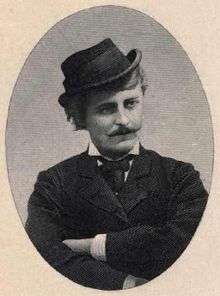Francis Saltus Saltus

Francis Saltus Saltus (November 23, 1849 – June 24, 1889) was an American poet.
Biography
Born in 1849 in New York City to Francis Henry Saltus and his first wife, Julia Augustus Hubbard,[1] he was the elder half-brother of once popular but now relatively obscure novelist Edgar Saltus.[2] He was educated at Columbia University[3] and later at the Roblot Institution in Paris.[4] Saltus was the leader of a group of bohemians in New York, including his brother Edgar and the young James Huneker, which met at Billy Moulds' bar in Manhattan's University Place; they were fond of absinthe and had "a taste for anything exotic".[5] Van Wyck Brooks remarked that the unhappy Saltus "looked like a Greek god gone to ruin, partly as a result of the absinthe that he drank to excess".[6] His verse reflects a refined, erotic and decadent temperament similar to that of his brother, inspired primarily by Edgar Allan Poe, Théophile Gautier (of whom he was a student)[7] and Charles Baudelaire. He was praised by influential editor William Marion Reedy as an 'American Baudelaire' whose verse had "the perfume of exquisite sadness."[8] Able to converse in ten languages, Saltus also wrote poems in Italian, German and French.[3]
He was a frequent contributor to American and international periodicals, such as Town Topics. A talented musician, he wrote four comic operas and much musical criticism.[2] Much of his humorous, commercial work was written under the pseudonym Cupid Jones. Saltus wrote and edited a comic paper entitled the Thistle in the 1870s, the entire contents of which were written by him and signed with various pseudonyms.[9] After an illness lasting several weeks, he died at midnight on June 24 of 1889 at the Riverside Sanitarium in Tarrytown, aged thirty-nine[10] and was buried in Sleepy Hollow Cemetery.[11] Saltus' father, Francis H. Saltus, edited a four-volume edition of his poetical works after his death.[4] Saltus left behind a good deal of unpublished material, including "five thousand lyrics for posthumous publication"[8] and several musical biographies, including a life of Gaetano Donizetti which was never published.
Bibliography
- Honey and Gall (1873)
- Shadows and Ideals (1890)
- The Witch of En-dor and Other Poems (1891)
- Dreams after Sunset (1892)
- Flasks and Flagons, Pastels and Profiles, Vistas and Landscapes (1892)
- The Bayadere and Other Sonnets (1894)
- Fact and Fancy (1895)
Notes
- ↑ Vrooman, Jr., Isaac H. (20 March 1909), New York Times Saturday Review of Books, New York City: The New York Times, retrieved 26 October 2015
- 1 2 The Bookmart: Volume Seven, June, 1889 to May, 1890. Page 95.
- 1 2 Vechten, Carl Van. Excavations: a Book of Advocacies. Page 95. Ayer Publishing, 1971.
- 1 2 Stedman, Edmund Clarence (editor). An American Anthology, 1787-1900. Page 819. Houghton Mifflin, 1900.
- ↑ Morris, Lloyd R. Incredible New York. Page 177. Ayer Publishing, 1975.
- ↑ Brooks, Van Wyck. The Confident Years, 1885-1915. Page 3. Dutton, 1955.
- ↑ Huneker, James. Steeplejack. Page 12. Charles Scribner's Sons, 1920.
- 1 2 Putzel, Max. J. The Man in the Mirror: William Marion Reedy and His Magazine. Page 44. University of Missouri Press, 1998.
- ↑ The Bookman: an Illustrated Magazine of Literature and Life: Volume XXII, September, 1905-February 1906. Page 82.
- ↑ The New York Times: Obituary, Page 5. June 26, 1889.
- ↑ Crandall, Charles Henry (editor). Representative Sonnets by American Poets. Page 342. Houghton, Mifflin and Company, 1890.
External links
- Works by or about Francis Saltus Saltus at Internet Archive
- Works by Francis Saltus Saltus at LibriVox (public domain audiobooks)

- Selected Works by Francis Saltus at Poets' Corner
- Absinthe related poems by Francis Saltus at Absinthe.se